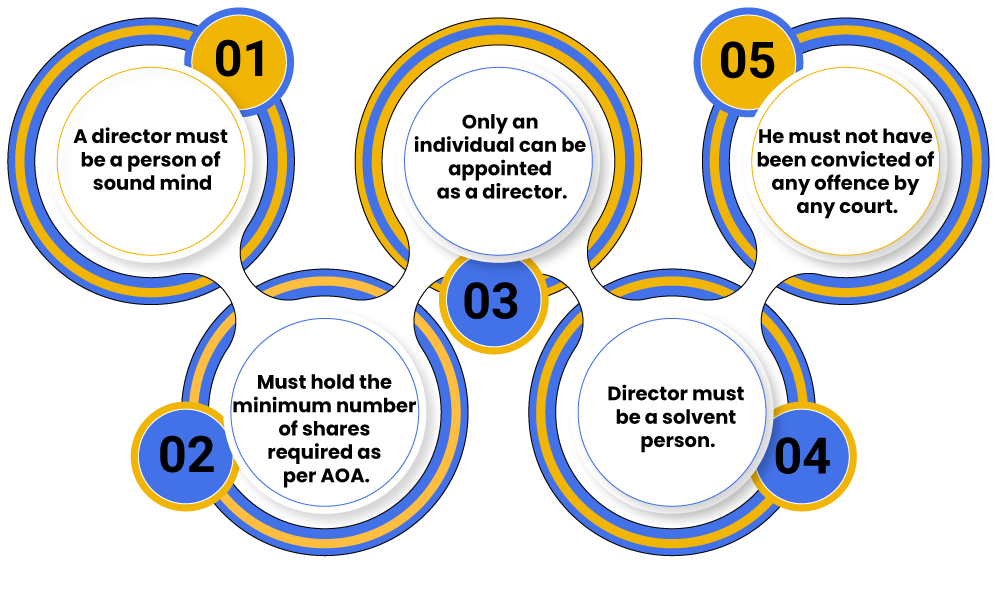Overview of Change in Directors
Changing a Company's Directors means either an appointment of the director or removal & resignation of the directors as per the Companies Act, 2013. Though such change can be for any reason of Company, it has to be approved & authorized through Article of Association (AOA) and provisions of the Companies Act, 2013. Hence the resignation & appointment of the directors shall be in accordance with the provisions stated under Companies Act, 2013, and shall be supported by legal documentation and procedures. And such change shall be intimated to ROC on time.
Highlights of Change in Directors
Fundamental key-points and highlights for the change in the directorship of a Private Company or Public Company that should be considered by a company before initiating change in directors:
- The provisions of Companies Act, 2013, states that every private company must have a minimum of 2 directors & a public company must have a minimum of 3 directors. The maximum number of directors in a private company can be 15 directors. Thus, this requirement should be kept in mind while changing directors.
- A foreign national can be a director in a company, whether it’s a private company or a public company.
- Every director to be appointed must have fulfilled the mandatory requirement, such as:
- Every director to be appointed must hold valid and active Director Identification Number (DIN).
- He or She must be a minimum of 18 years of age.
- The director to be removed must have an opportunity of being heard along with the valid reason from the Board of Directors. And a resigning director must give a resignation letter or his notice of resigning in writing to the board of directors. The resigning director also needs to submit his resignation to ROC in form DIR-11 within 30 days from resigning.
Appointment of Director
An individual who has been appointed or elected as a director of the company is responsible for implementing and determining the policies for the company, moreover, they are the members of the Board of Directors. Director is an individual who manages, directs, oversees, & controls the matters in the business. Section 149(1) of Companies Act, 2013, says that every company shall have a board that consists of directors.
- Appointment in Public Company
2/3rd of the total number of directors has to be appointed by shareholders. Remaining 1/3rd get appointed as per the provisions of Article of Association of the company.
- Appointment in Private Company
as prescribed in the Articles of the company. In the absence of an article, an appointment is to be made by shareholders.
Qualification for The Appointment of Directors

There are no exact provisions for the qualification of directors in Companies Act, 2013. Although certain qualifications are required:
- A director must be a person of sound mind
- There must behold of the minimum number of shares required as per AOA.
- Only an individual can be appointed as a director.
- Director must be a solvent person.
- He must not have been convicted of any offence by any court.
Procedure for The Appointment of Directors
- Every director who willing to be appointed as a director in any company must have a valid Director Identification Number (DIN).
- DIN can be applied online in form DIR-3.
- Digital Signature Certificate of a director is the primary requirement for applying DIN online. Therefore, he must have DSC with a validity period.
- Documents required to be attached with the form DIR-3 for applying DIN online:
- Passport size photograph
- ID proof
- Residential proof
- Call the Board meeting to approve the appointment of the director and approve the 21 days’ notice for calling an EGM.
- Company then calls and holds the EGM for passing the necessary resolution for the appointment of directors.
- After the appointment of director company has to maintain the following documents as required by promoters of the Company:
- Attendance sheet of the EGM
- Minutes of EGM
- Proof of dispatch of the notice.
- Copy of Notice to call EGM
- Submit the form DIR-12 with ROC within 30 days of passing resolution along with the following documents as an attachment annexed to the form:
- Consent letter in form DIR-2
- Appointment letter
- Interest in other entities in form MBP-1
- Id proof & residential proof
- CTC of the resolution passed
Disqualification of Directors
Section 164 of Companies Act, 2013 stipulates that the person cannot be appointed as a director if he had the following disqualification:
- If the director is of unsound mind.
- If he is undischarged insolvent
- If he has applied to be adjudicated as an insolvent
- Has been convicted of an offence involving moral turpitude
- Has not paid any calls for his unpaid shares
FAQs of Change in Directors
Following is the list of documents required to be submitted by the company:
- Copy of notice issued to call EGM
- Attendance sheet of EGM
- Proof of dispatch of the notice.
- Minutes of the said meeting
- Certificate from an auditor declaring that appointing director hold valid DIN & is not disqualified for being appointed
- Affidavits from the entire disqualified director stating the reason for their disqualification.
- Consent letter in form DIR-2, interest in other entities in form MBP-1 and disqualification, if any in form DIR-8
Following are the types of directors to be appointed by a company:
- Women director
- Independent director
- Resident director
The director who has resigned from the company is liable for all the acts done under his directorship in a company. That is, he is liable even after resignation for the offenses done under his tenure.


